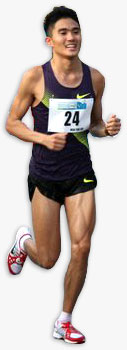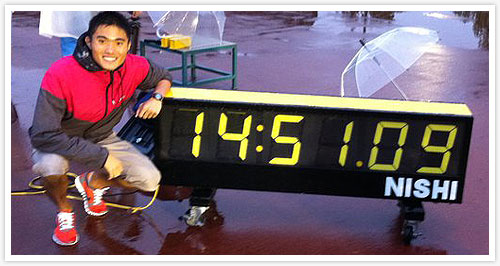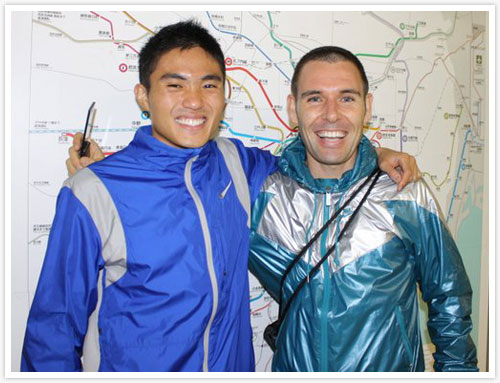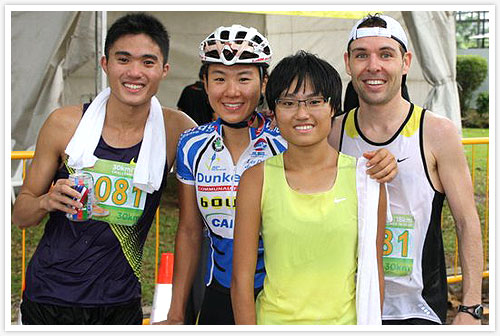|
Posted by Sha
|
 Imagine running an average of 71 seconds per lap for the next 12 rounds of a 400 meter track.
Imagine running an average of 71 seconds per lap for the next 12 rounds of a 400 meter track.
Then muster around another 39 agonizing seconds for the next final 200 meters until the finishing line.
Well if you’re capable of such a punishing pace, then you could add yourself into the record books for the 5,000m men’s event.
One person in-fact has done such a remarkable feat, and he’s no other than local distance running champ, Mok Ying Ren.
At the recent Tokai University Time Trials 2011, he finished in a time of 14:51.09. The timing surpassed the previous national record of 14:57.61 held by Nadarajan Ganesan, set some 15-years back at Koln, Germany in 1995 (Pending ratification by SAA).
Mok, a final-year medical student who ran in only his third 5,000m finals race this year also qualifies for the SEA Games.
The 23-year-old managed to better the event bronze result from the previous edition games, which was set as a benchmark by our local sporting body as a means for athletes to qualify for the biennial games.
Mok, the SEA Games 2007 triathlon champion turn marathoner these days, has just won the Christchurch Marathon held during the last weekend. The news which came in yesterday, highlighted Mok Ying Ren recent good form. He finished in a time of 2:26:34, which is well within 2 per cent of the SEA Games qualifying mark of 2:25.19 for the men’s marathon event.
Profile
Name: Mok Ying Ren
Height: 172cm
Weight: 59kg
Date of Birth: 6th July 1988
Current School: National University of Singapore, Yong Loo Lin School of Medicine
Previous Schools: Red Swastika Primary School, Raffles Junior College
Coach: Self-coached
Personal Best:
- Marathon: 2:26:34 (Christchurch Marathon 2011)
- 1/2 Marathon: 1:08 (2011)
- 10,000m Track: 32:26 (2011)
- 5,000m Track: 14:51.09 (Japan, 2011)
- 1,500m Track: 4:12 (2006)
Below is an extract of SAA interview with Mok Ying Ren. Photos and video courtesy of Mok:
Q) Did the record come as expected & planned? Did any of your prior runs, trainings or time-trial and form indicates that the national mark will fall any time soon.
Mok Ying Ren: At the beginning of the year, the plan was not to break the 5000m record but to run a mid-year marathon.
In April, even though we were doing non-specific training, “Base building” as it is called in running circles we felt that the 5000m record pace seemed possible because I was just so fit.
With the opportunity to break the national record arising, we decided to do a few sessions at record pace. Our training indicated the possibility but nothing is definite in sports, we just have to train our best!
Watch Mok Ying Ren run a blistering 14:51.09 at the Tokai University Time Trials 2011.
Q) Last year in December you ran 15:49.10 at the Asean University Games, and fast forward 5 months plus later, you’ve just broken the national record in a time of 14:51.09. That’s a remarkable feat of improvement, as you slashed some 1 minute plus. Between then and now, what have you focused on off & on the track to aid in your record-breaking cause?
Mok Ying Ren: Last year December, I ran that time at the 15th Asean University Games after running the Singapore marathon the week before. Physically and psychologically, I was not prepared. I have however done a 15:23 in a time-trial setting in 2010 in NUS so the actual improvement was not that drastic.
In January the plan for Jason (Mok’s training partner) and I was to train for a mid-year marathon. Training was going great and long tempo runs were at near previous race pace. After a few months we thought that we should do a 5 kilometer race to test our fitness. That gave a 15:17 in harsh early morning heat at the SAA 3rd Track & Field series.
Considering how many things went wrong that day (we went to the wrong track for starters). The record was well within reach. Jason unfortunately became ill with sinus problems after returning from New Zealand, where he was supporting family and friends after the horrific earthquake in his hometown, Christchurch. He was no longer able to complete workouts but still acted a pacemaker for as much of the workout as possible. He is about to go in for surgery so we will be back at full strength real soon.

Mok posing proudly with his new record mark for Singapore men’s 5,000m event after his race in Japan
Q) I was told you initially were going for Taiwan Open, which falls on the same competition week, but opted for Tokai University Time Trials. Why the sudden change of plan?
Mok Ying Ren: Yes, I initially planned to go for the Taiwan Open under the advice of the SAA. However, I reviewed the past year results of that meet which showed that it was not optimal to set a record as only two runners ran under 15 minutes last year.
If i am not wrong, this year, the first 3 kilometer was on 15 minutes plus timing pace before two Kenyans went on the run 14:47 at the end. However, at the Japanese meet I competed in, I researched and found that past year results had 10 runners running at Singapore record pace. Thus, competition would be more honest and suitable for my level.
In addition, climate wise, Taiwan was similar to Singapore and to give myself the best possible chance, it would be better to go to a country with a huge climatic difference. In Japan, it was 21 degrees with 85% humidity. It is excellent for distance running.
Thirdly, United Airlines was having a sale on Japan flights – 2 to go for $800 for a return trip. Jason (Mok’s training partner) and I jumped at the chance.
Q) The previous question brings up a good topic on proper pacing, pacers, and racing conditions. The 5K record before yours was set in Germany, while yours in Japan. Ideally does overseas competition provides a better competitive environment for distance running record-breaking attempts? Looking ahead, locally what else more can be done to help you go even faster.
Mok Ying Ren: I think it is a big YES for distance running. Distance running is so different from sprinting, jumping or throwing in the sense that physiologically and psychologically (if you use the central governor model) we are much more affected by competition and climate due to the duration of the event.
I am not sure if I am right to say this and correct me if I am wrong – One can probably grit one’s teeth and sprint the last 30m in a 100m race by yourself and perform reasonably well. However, it is difficult for a distance runner to run the last 3km (+/- 9 minutes) of the race himself hoping to do a good time, even more so in the heat. Thus, it is important to for distance runners to compete overseas.
I would like to thank SAA for organizing the night time trial at SAA Track & Field Series 4, as you can see it allowed me to cut 10 seconds off my time (Mok finished in a season and personal best of 15:05.98 before his record-breaking run in Japan).
I would like to thank Mr Ogden, Mr Loh, Mr Kunalan and the other members of the committee for being very supportive and encouraging. I firmly believe that ALL MEETS in Singapore should be held at night. This is because of the climate of Singapore. All athletes will do much better in cooler conditions. Even in cooler climates overseas, meets are often held at night. The ASEAN university games in 2008 held at Kuala Lumpur was also held at night.
Singapore has the resources – stadiums with flood lights. I think the cost should not be given as en excuse for not having night meets. Affiliates should volunteer their stadiums flood lights to use for meets, taking turns to share the cost. Only then, can Singapore athletics, especially distance running can improve.
You can possibly say that because of the schedule of the meets in hot sun, our athletes are running well below their potential compared to if they had ran their race in the evenings. Jason and I often discuss about young athletes and their parents benefiting from a compact night meet. Alternate two schedules rather than hosting every single event/distance, throw in some music, encourage the parents to bring along a picnic basket and so on. Wouldn’t that be great?
Q) You had glowing comments about your training partner Jason Lawrence. Tell us more about him, his role, and how he has helped you.
Mok Ying Ren: He is a great guy and we are very good friends as well as rivals! He is from New Zealand, lived in Japan for more than 6 years and is now a PE teacher at the Overseas Family School.
He has worked with the full spectrum of athletes, African and Japanese Olympic medalists right down to beginners young and old.
He himself is a 2:28 marathoner and has a 5000m Personal Best of 14:50 (still 1 second faster than me!). He is my ultimately my training advisor though we bounce ideas and work on our long term goals together. We train together at least once a week on top of our long runs on the weekend.
He has a lot of coaching experience and probably taught himself to read with running magazines – his father was marathon runner and was coached by the great Arthur Lydiard, regarded by many in the sport as the greatest.
I hope that SAA can work with him to lift the levels of distance running in Singapore. It is time for change, otherwise distance running in Singapore will continue to drift.

Mok and his training partner, Jason Lawrence, while in Japan.
Q) From now till SEA Games, what will you be focusing on in your training and competitions. What are your SEA Games expectations and goals in Palembang, Indonesia?
Mok Ying Ren: I will be training hard for a medal at the SEA Games.
I am hoping that SAA and SSC can card me as soon as possible to allow me to receive medical and recovery support. I do have some niggling injuries that Dr Cormac at Singapore Sports Institute (Singapore Sports Council) can help me with.
Q) You’re a final-year medical student. Where do you go from here when you graduate. Will you have enough time to train still. How important are sponsorship and assistance from NSA (e.g. carding, grants). Lastly can you give an insight of your weekly training in summary for our readers.
Mok Ying Ren: I graduate in April next year and will start working as a house officer in a public hospital. Time may become an issue. I am inspired by Japanese amatuer runner, Yuki Kawauchi, who works full time as a high school administrator and yet runs a 2:08 marathon. It is possible.
I think NSA assistance is very important. Unfortunately, I did not get any such support (in the form of carding) from SAA and SSC since I left triathlon in 2008. For the past 2-3 years, I have had no access to medical and recovery services from the Singapore Sports Council. Doctors and Physiotherapists are very important at our level of competing and I think due to this, my performance was affected to a certain extent over the last few years.
For these reasons, it was very important for me to secure corporate sponsorships on my own. I am thankful for Nike, Science in Sport, Oakley and Core Concepts for assisting with my training requirements. I also have friends who work in the sports massage line who help me when I need help. I am very thankful for their support.
Q) I believe you’re self-coached. Can I asked, did you have any coach(es) before? Why opt for this path. Wouldn’t you want someone to track your progress, observe your form, and plan your schedule. Or do you think our local distance coaches is not up to par. If so, what does it say about the standard of our distance coaches?
Mok Ying Ren: My first coach was Mr Steven Quek in Raffles Junior College. He was a great coach and he equipped me with the skills on how to be a good student athlete that I have now. He has taught me on the principles of training and the importance of recovery and nutrition for athletes. I still go back to his words when in doubt some times.
In 2007, I started coaching myself because as a triathlete, I feel that there are many more variables in training that needs to be addressed in the swim and bike component.
Since 2009, when I decided to focus more on running, it so happens that medical school becomes more clinical based – meaning the need to travel to hospital daily and being our feet the whole day, our schedule can be tight at some periods and as a self-coached athlete, I can arrange my training and schedule easily. I would say it is more for practical reasons. As mentioned previously, Jason (Mok’s training partner) oversees my training which means I don’t need to spend as much time planning my schedules.
Coaches in Singapore should travel abroad if given the opportunity to countries like to Japan where I just returned from to see how coaches coach the athletes there and to bring the experience back to Singapore. Perhaps SAA can arrange for such exchanges. It is always good to learn from others and adapt the concepts to meet Singapore’s environment and needs.
Q) Past glories of Singapore distance champions such as P.C. Suppiah, and K. Jayamani are but just cherished memories now, and it seems that these recent years our distance events are in the doldrums. What efforts and initiatives do you think can be made to generate interest & braining back the glory days of distance running.
Mok Ying Ren: I think that more focus can be placed into distance running in Singapore. Road races are extremely popular but the top end does not compare with neighbouring countries that have arguably less resources. We have the quantity – now we need to turn that into quality.
Hosting night meets will be a good start to raise standards and to allow our athletes the best possible environment to perform. As well as increasing the overall interest in the sport.
Next, the carding system should not be pegged to SEA Games bronze medal standards for distance events. Why? Because different sports are at a different levels of development.
The Swimming Program for example is very well developed in Singapore – many swimmers meet the bronze medal timing therefore many swimmers get support to bring the level up to Asian games standard. Now take a step back and look at distance running – the current bronze medal qualifying time is equivalent to a national record – it shows that the region has moved on and left Singapore behind.
This will mean by pegging support to SEA Games bronze medal standards, NO athlete will be supported till they break the record. Yes, some people will say it’s unfair and so on. But it’s obvious that every sport is at a different level of development and no matter what athletes need support to have a breakthrough, support is required to bring more athletes up to SEA Games level – stepping stones need to be put in place and short term goals can be set more realistically.
Imagine if a new sport NSA was set up – none of the athletes have been to the SEA Games and are all beginners. Do we say “hey guys, go get a medal at the SEA Games with your own money, own resources then we will support you?” Or do we say “alright guys, you guys are new, we will support you, have faith in you, you guys commit to this project and we will support you all the way and hope you get a medal”.
This is the scenario we are facing in distance running and I think it’s a difficult decision for any committee as it must be impartial and at the same time provide support. I guess it’s a fine balance and striking that balance is not easy.
Q) How did you get started in athletics, and when did you start specializing in distance running. Do you play any other sports, and with all the studying & training, do you even have the time to socialize even.
Mok Ying Ren: I was a swimmer since Primary five at Red Swastika Primary School. I then started triathlon in Raffles Junior College, focussing more on running in the last two years when in Year 3 of medical school.
I think distance running takes a lot of commitment. It is not a technique sport where stopping for one week does not affect your performance much.
Just one week of not running will bring effects of detraining to our body with our blood volume shrinking dramatically and the erosion of blood vessels.
Therefore, I need to be consistent with my training. I have less time to socialize but I do have a wonderful and supportive girlfriend, Dinah.

Mok is grateful for the support he has received from family and friends. In picture are his main pillars of support, from the left, girlfriend Dinah, sister Mok Ying Rong, and training partner, Jason Lawrence.
Related Links:
Mok Ying Ren FaceBook page
A previous interview when Mok did triathlon #1, #2
Christchurch Marathon 2011 result
Tokai University Time Trials 2011 result
|
6th Jun 2011
|




